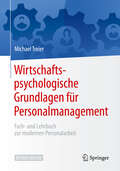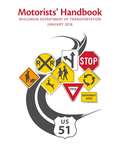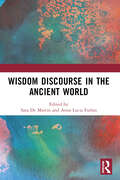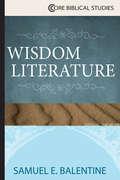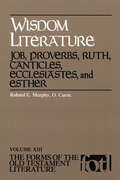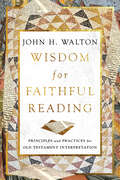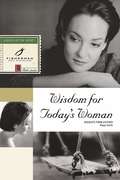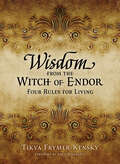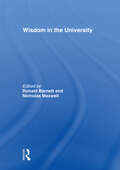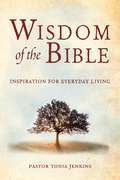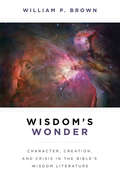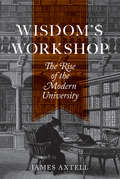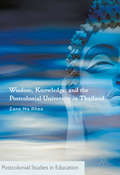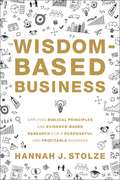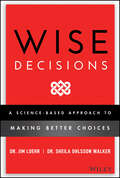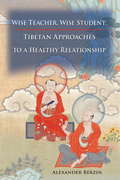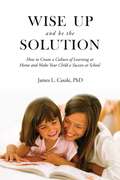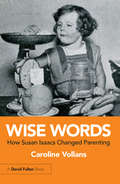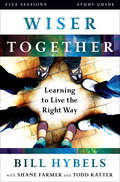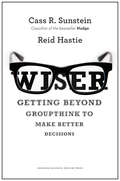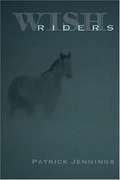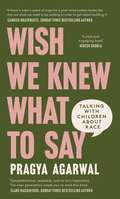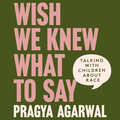- Table View
- List View
Wirtschaftspsychologische Grundlagen für Personalmanagement: Fach- und Lehrbuch zur modernen Personalarbeit
by Michael TreierEine moderne Personalarbeit kann es sich in Anbetracht der Herausforderungen der Arbeit 4.0, des demografischen Wandels und Fachkräftemangels nicht leisten, Personal nur zu verwalten, denn der Mensch avanciert zum Potenzial- und Wertschöpfungsträger. Personalarbeit transformiert sich deshalb zum Gestalter mit dem erklärten Ziel, das organisationale Verhalten des Personals zielgerichtet zu beeinflussen. Personalmanagement und Wirtschaftspsychologie treten dabei als Gespann auf, um die knappen und wertvollen Humanressourcen im Spannungsfeld zwischen ökonomischen und sozialen Zielen zu erhalten und zu fördern. Viele „Nicht-Wirtschaftspsychologen“ im Personalbereich stehen vor der Herausforderung, psychologische Methoden und Instrumente in ihr Aufgabenportfolio zu integrieren. Dieses systematisch und didaktisch klar aufgebaute Fach- und Lehrbuch greift die Herausforderung auf, wirtschaftspsychologische Themen im Personalmanagement entlang der Wertschöpfungskette der Personalarbeit theoretisch fundiert und praxisnah zu platzieren. Auf jeder Station der Personalarbeit - von der Planung bis zur Freisetzung - werden Ihnen personalwirtschaftliche Grundlagen und wirtschaftspsychologische Bausteine vorgestellt, anschaulich erklärt und verknüpft. Zu den Herausforderungen der Zeit wie Digitalisierung, flexible Arbeitszeitmodelle und Wertewandel bietet es Ihnen hilfreiche Beispiele und Tipps. Zusätzlich gibt es Arbeits- und Informationsmaterialien Online zum Download.Die Zielgruppen Personalverantwortliche, Führungskräfte und Berater sowie Wissenschaftler und Studierende im Bereich Personalmanagement und Wirtschaftspsychologie, die Personal als wertschaffende Ressource wertschätzen. Der AutorProf. Dr. Michael Treier lehrt an der Fachhochschule für öffentliche Verwaltung NRW in den Bereichen Personal, Organisation und Psychologie. Sein Forschungsschwerpunkt liegt im Demografie- und Gesundheitsmanagement. Als Berater betreut er Unternehmen der Privatwirtschaft und Organisationen im öffentlichen Sektor.
Wisconsin Motorists' Handbook
by Wisconsin Department of Transportation<p>This manual is intended to inform the user of the rules of the road (Wisconsin state laws and Administrative Rules) and provide important safety tips. Information in this and other handbooks and manuals published by the Division of Motor Vehicles is not all-inclusive and is subject to change at any time due to new or revised laws. <p>This manual gives you information on driving rules and practices to help you become a safe driver of a car or light truck (Class D license). <p>If you want a Commercial Driver License (CDL) to drive a commercial motor vehicle (heavy truck, bus, Class A, B, or C), you should study the Wisconsin Commercial Driver's Manual. <p>If you want a license to operate a motorcycle (Class M license), you should study the Motorcyclists' Handbook.</p>
Wisconsin Motorists' Handbook
by Wisconsin Department of TransportationWisconsin Motorists' Handbook
Wisconsin Motorists' Handbook
by Wisconsons Department of TransportationThe Wisconsin Motorists Handbook gives you information on driving rules and practices to help you become a safe driver of a car or light truck.
Wisdom Discourse in the Ancient World
by Sara De Martin Anna Lucia FurlanThis book moves beyond the debate on ‘wisdom literature’, ongoing in biblical studies, to demonstrate the productivity of ‘wisdom’ as a literary category. Featuring work by scholars of Egyptology, classics, biblical and Near Eastern studies, it offers fresh perspectives on what makes a text ‘wisdom’.This interdisciplinary volume widens the scope of the investigation into ‘wisdom literature’, chronologically, geographically, and methodologically. Readers are given insights into how the label ‘wisdom’ contributes to our understanding of diverse literary forms across time periods and cultural contexts. In the volume’s introduction, the editors consider ‘wisdom’ as a ‘discourse’, shifting the focus from the debate on whether ‘wisdom literature’ is a genre to the properties of the texts, namely exploring what makes a text ‘wisdom’. This offers a methodological backdrop against which the diverse approaches of the single authors productively coexist. The chapters examine texts that are the products of different ancient cultures, with several of them bridging diverse cultural, social, and chronological contexts. By sampling how different methodologies interact both within individual interpretative efforts and in wider attempts to understand cross-cultural literary phenomena, this volume also contributes new perspectives to the scholarship on ancient literary genres.Wisdom Discourse in the Ancient World will interest both students and scholars of the ancient Near East, Egyptology, classical studies, biblical studies, and theology and religious studies, particularly those working on wisdom literature in antiquity. It will also appeal to readers with an interest in comparative approaches and genre studies more broadly.
Wisdom Literature (Core Biblical Series)
by Samuel E. BalentineIf the fear of the Lord is the beginning of wisdom formed in the life of faith, its end is nothing less than the shaping of a moral self and community attuned to the character of God. This pursuit of wisdom is an ongoing journey, never a simple arrival.For the wisdom writings of the Old Testament, the pursuit of wisdom calls for the ongoing attainment of instruction, insight, shrewdness, knowledge, prudence, learning, and skill. And persons who attain wisdom think more deeply, are more discerning, and have a keener insight into the complexities and nuances of decision making. For a world-perspective that assumes the power and reality of divinity, being wise means living ethically - and to live ethically, one must be in a constant intellectual pursuit of meaning.The book details the structure, themes, and contribution to both ancient and modern society of Job, Proverbs, and Ecclesiastes. The chapters on Sirach and the Wisdom of Solomon will discuss the consonance and dissonance with "canonical wisdom," giving special attention to the development of their core ideas. The book will conclude with a chapter on Wisdom’s abiding legacy.
Wisdom Literature: Job, Proverbs, Ruth, Canticles, Ecclesiastes, and Esther (The Forms of the Old Testament Literature)
by Roland E. MurphyMurphy sees three of the six books (Proverbs, Job, and Ecclesiastes) as being technically 'wisdom literature.' The others are either love poems or historical narrative that fit well within the context of the subject presented here. In this volume previous form-critical work is carefully evaluated, and the result is a thorough-going form-critical treatment of this part of the Old Testament. The work is enhanced by bibliographies for each Old Testament book and a glossary of general terms.
Wisdom for Faithful Reading: Principles and Practices for Old Testament Interpretation
by John H. WaltonThe church has too often lost its way in reading the Old Testament for lack of sound principles of interpretation. When careless habits get us off track, we can lose sight of what the Bible is really saying, derailing our own spiritual growth and even risking discredit to God’s word. We need a consistent approach to give us confidence as faithful interpreters. In Wisdom for Faithful Reading, the trusted Old Testament scholar John Walton lays out his tried-and-true best practices developed over four decades in the classroom. His principles are memorable, practical, and enlightening, including: The Bible is written for us, but not to us. Reading the Bible instinctively is not reliable and risks imposing a foreign perspective on the text. More important than what the characters do is what the narrator does with the characters and what God is doing through the characters. Not everything has a "biblical view." Along with identifying common missteps, Walton's insights point the way to stay focused on what the Old Testament text communicated to its original audience—and what it has to say for us today. When we submit ourselves to be accountable to the authors' intentions we experience the true authority of Scripture, and faithful reading fuels a faithful life. Using numerous examples across the breadth of the Old Testament and its genres, Walton equips thoughtful Christians to read more knowledgeably, to pay attention to God’s plans and purposes, to recognize good interpretations, and to truly live in light of Scripture. You may never read the Old Testament the same way again.
Wisdom for Today's Woman: Insights from Esther (Fisherman Bible Studyguide Series)
by Poppy SmithWomen in today's world face an onslaught of ever-changing challenges and circumstances. It's often hard to know how to respond. But centuries ago, one humble, extraordinary woman stepped into the limelight where she encountered great trials of her own--and became a model of godly living for all women to follow. As you study the dramatic life of Queen Esther you'll learn vital lessons about choices, personal trials, pride, faith, and control. More than that, you'll discover the essential, foundational truths upon which a wise woman builds her life and faith.From the Trade Paperback edition.
Wisdom from the Witch of Endor: Four Rules for Living
by Tikva Frymer-KenskyFour simple rules, amazing results—how wisdom from an overlooked biblical hero can change your life! Tikva Frymer-Kensky shows readers how a seemingly minor story in the first book of Samuel can teach them key lessons to dramatically improve their lives. Saul, abandoned by God, approaches a medium in the village of Endor to call up the spirit of Samuel. Though Saul had outlawed her craft, she helped him when he promised her safety. And after Samuel prophesied Saul&’s death, she showed the shaken king hospitality. Determination. Excellence. Caution. Benevolence. Four qualities of the &“witch&” of Endor will bring you success, even when the whole world stands against you. Are you ready to follow your dreams? To succeed when others tell you to give up? Embrace the wisdom of a little-known hero from the Bible—and see how it leads you to the life you were meant to live.
Wisdom in the University
by Ronald Barnett Nicholas MaxwellThis provocative and challenging book questions how people think about what universities should seek to do and how they should respond to the grave problems of our age. It addresses issues such as: What is wisdom? Ought universities to seek, promote and teach wisdom and what would this involve? Does it mean we need a revolution in the aims and methods of academic inquiry? What implications would the pursuit of wisdom have for science, for social inquiry and the humanities, for education? Is it reasonable to ask of universities that they take up the task of helping humanity learn how to create a wiser world? Is there a religious dimension to wisdom? What can non-academics do to encourage universities to take wisdom seriously? Would the pursuit of wisdom be possible given that universities are increasingly subjected to commercial pressures? With contributions from leading experts in various fields Wisdom in the University is essential reading for all those interested in the future of universities and philosophy of education.This book was previously published as a special issue of London Review of Education
Wisdom of the Bible: Inspiration for Everyday Living (Little Book. Big Idea.)
by Tonia JenkinsA collection of your favorite Bible verses organized for any occasion, Wisdom of the Bible is an invaluable resource. Wisdom of the Bible provides day-to-day insights and hope from the greatest story ever told. Too often in life, we struggle with uncertainty and anxiety; it is in these times that we can turn to the Scriptures for comfort and guidance. Presented in a clear, elegant format, Wisdom of the Bible draws on the Scriptures to provide words of advice and inspiration on relationships, love, family, and more. Taking as its credo that the best life is one that follows the principles of the Scriptures, Wisdom of the Bible brings these ages-old words of wisdom to life, along with practical advice from Pastor Tonia Jenkins' personal and professional experience. Wisdom of the Bible brings God's guidance to those who need it most. These words of wisdom and advice have guided countless lives for centuries; this book directs these perfect words of Scripture to those areas of life where they are needed most: matters of love and family, health and prayer, and even life and death. Providing insight not only into one's personal life, but also offering advice on how best to trust in God's wisdom and let his plan follow its plotted course, Wisdom of the Bible is the book to reach for whenever you need a word of wisdom. A great gift idea."Happy is the man that finds wisdom, and the man that gets understanding." --Proverbs 3:13
Wisdom's Wonder: Character, Creation, and Crisis in the Bible's Wisdom Literature
by William P. BrownWisdom's Wonder offers a fresh reading of the Hebrew Bible's wisdom literature with a unique emphasis on "wonder" as the framework for understanding biblical wisdom. William Brown argues that wonder effectively integrates biblical wisdom's emphasis on character formation and its outlook on creation, breaking an impasse that has plagued recent wisdom studies. Drawing on various disciplines, from philosophy to neuroscience, Brown discovers new distinctions and connections in Proverbs, Job, and Ecclesiastes. Each book is studied in terms of its view of moral character and creation, as well as in terms of the social or intellectual crisis each book identifies. Most general treatments of the wisdom literature spend too much time on issues of genre, poetry, and social context at the neglect of discussing the intellectual and emotional power of the wisdom corpus. Brown argues that the real power of the wisdom corpus lies in its capacity to evoke the reader's sense of wonder.An extensive revision and expansion of Brown's Character in Crisis (Eerdmans, 1996), this book demonstrates that the wisdom books are much more than simply advice literature: with wonder as the foundation for understanding, Brown maintains that wisdom is a process with transformation of the self as the goal.
Wisdom's Workshop
by James AxtellWhen universities began in the Middle Ages, Pope Gregory IX described them as "wisdom's special workshop." He could not have foreseen how far these institutions would travel and develop. Tracing the eight-hundred-year evolution of the elite research university from its roots in medieval Europe to its remarkable incarnation today, Wisdom's Workshop places this durable institution in sweeping historical perspective. In particular, James Axtell focuses on the ways that the best American universities took on Continental influences, developing into the finest expressions of the modern university and enviable models for kindred institutions worldwide. Despite hand-wringing reports to the contrary, the venerable university continues to renew itself, becoming ever more indispensable to society in the United States and beyond.Born in Europe, the university did not mature in America until the late nineteenth century. Once its heirs proliferated from coast to coast, their national role expanded greatly during World War II and the Cold War. Axtell links the legacies of European universities and Tudor-Stuart Oxbridge to nine colonial and hundreds of pre-Civil War colleges, and delves into how U.S. universities were shaped by Americans who studied in German universities and adapted their discoveries to domestic conditions and goals. The graduate school, the PhD, and the research imperative became and remain the hallmarks of the American university system and higher education institutions around the globe.A rich exploration of the historical lineage of today's research universities, Wisdom's Workshop explains the reasons for their ascendancy in America and their continued international preeminence.
Wisdom, Knowledge, and the Postcolonial University in Thailand (Postcolonial Studies in Education)
by Zane Ma RheaThis book examines Thai knowledge and wisdom from the perspective of postmodern, postcolonial globalization. Ma Rhea explores the ways in which the Thai university system attempts to balance old knowledge traditions, Buddhist and rural, with new Thai and imported knowledge. It traces the development of Thai university partnerships with outsiders, focusing on the seventy year relationship between Thailand and Australia. In comparison, it analyses the old Thai Buddhist wisdom tradition and in the final chapters proposes its worthiness as a pedagogical pathway for universities globally.
Wisdom-Based Business: Applying Biblical Principles and Evidence-Based Research for a Purposeful and Profitable Business
by Hannah J. StolzeMake Your Business Purposeful and ProfitableAt its best, business is both purposeful and profitable, dynamic and gainful, commercial and rewarding. Far from being opposites, good business and good behavior go hand-in-hand, and biblical principles can align with best practices. In Wisdom-Based Business, marketing and supply-chain professor Hannah J. Stolze draws principles from the Bible's wisdom literature and from evidence-based research to create a framework for business that is oriented toward excellence and sustainability. This book addresses import issues such as:The virtue of profitServant leadershipWisdom-based values, such as long-term over short-term, stakeholders, and qualityBeneficial outcomes of wisdom-based business, including reputation and comparative advantageThe ultimate outcome of eternal impactIntended for business students and working professionals alike, Wisdom-Based Business demonstrates how to pursue profitability to the honor and glory of God. Unique among Christian books on business, it helps readers make the right decisions in business by presenting:Biblical Principles. Drawing upon the Bible's wisdom literature, each topic addressed is undergirded by insights from Scripture.Evidence-Based Research. Recommendations are thoroughly grounded in the best and latest research in the field.Case Studies: Each chapter demonstrates how the principles can be lived out in the real world, amid the inevitable challenges and competition all business confronts. Any Christian who works in the marketplace or is training to work in the marketplace will benefit from Wisdom-Based Business' practical guidance on how to reflect Christian values in their corporate tasks and strategies--and on how those values can be not hindrances but keys to success.
Wise Decisions: A Science-Based Approach to Making Better Choices
by James E. Loehr Sheila Ohlsson WalkerA concrete and hands-on method for improving your everyday decisions Every 15 minutes, each of us can make ten or more small decisions. Some of them are relatively inconsequential, while others can change the course of our lives. What if you could improve all of your decisions, across the board, and start to build a healthier, more productive, and meaningful life? In Wise Decisions: A Science-Based Approach to Making Better Choices, a team of accomplished industry experts delivers an evidence- and research-based blueprint for making the best decisions you can with the information you have. You’ll learn to make the targeted, repeated investment of energy required to turn your decision-making process into one informed by reason, emotion, intuition, and science. In the book, you’ll discover: How to put the decision-making process under a microscope and learn what makes a decision truly wise Ways to help children, teens, and families make wise decisions How to train yourself to make wise decisions with voice training and other strategiesA can’t-miss resource for parents, teachers, coaches, managers, executives, and other business leaders, Wise Decisions also offers timeless advice and guidance for anyone else hoping to improve the decision-making abilities of the people close to them.
Wise Teacher, Wise Student
by Alexander BerzinThe relationship with a spiritual teacher can be the most rewarding and life-enhancing experience in one's life. However, it also may be fraught with problems. Student reactions to their spiritual teachers may range from extreme deification to deep mistrust, and these responses prevent the benefits of a healthy relationship. This book explores the sources of these misunderstandings and re-examines traditional Tibetan Buddhist teachings revealing methods to heal wounds and develop healthy relationships that can be applied to benefit students in any spiritual tradition.
Wise Up and Be the Solution: How to Create a Culture of Learning at Home and Make Your Child a Success in School
by James CasaleAs parents, we simply want what’s best for our children, but sometimes the modern education system does not always cater to the individual needs of every child. Each child is unique and requires different amounts of attention and support. As your child’s first teacher, you are the most influential factor on his or her growth--academically, emotionally, and psychologically. In Wise Up and Be the Solution, James Casale shows you how to be more proactive and have more control over your son or daughter’s education. With 50 years of teaching experience, Casale gives you the tools to change your family dynamic for the better. This book is straightforward, jargon-free, and easy to follow. Parents will learn how to gain their children’s attention and how to limit the things that can distract them. Casale also discusses parent-teacher conferences from an educator’s perspective, allowing parents to better understand teachers and be more prepared during these meetings. This book is a must have guide for parents who are eager to see their children succeed in school and life. It provides all the necessary tools to creating a culture of learning right in your home.
Wise Words: How Susan Isaacs Changed Parenting
by Caroline Vollans"Harassed" writes: "Your answers to correspondents are exceedingly clear, and when I read them I say, ‘That is just the answer I should think of’, though I believe I should have great difficulty when it came actually to putting it into words! However, I cannot answer my own problems, so will you please help me?" (20 August 1930) This much-needed collection brings together the columns of parenting adviser Ursula Wise, "agony aunt" for The Nursery World between 1929 and 1936, and pseudonym for the eminent educationalist and pioneering psychoanalyst Susan Isaacs. Wise’s replies, informed by theories in education, psychology and psychoanalysis, provide an insight into the development of modern, child-centred attitudes to parenting, with remarkably fresh and relevant advice. The letters are passionate, urgent, occasionally provocative, sometimes funny and always thoughtful. Topics from behaviour and temperament, anxieties and phobias, to play and education are explored and each theme is introduced and contextualised in contemporary parenting approaches. Bringing pivotal theories from the fields of education, child psychology and psychoanalysis into dialogue, this is an essential read for early years practitioners, teachers, course leaders and those studying in the field of early years education and child psychoanalysis. The continued relevance of Isaacs’ advice for modern parenting also makes this an enjoyable and informative read for parents. It is also an excellent resource for those interested in social history and the little known contributions made by women pioneers.
Wiser Together Study Guide: Learning to Live the Right Way
by Bill Hybels Shane Farmer Todd KatterIn this five-session video-based Bible study, best-selling author and pastor Bill Hybels challenges you to make doing life together a priority, exploring from the book of Proverbs how experiencing community and growing in wisdom are inseparably linked and offering practical direction on how to experience this with others. All of us want to get better at life. Gettting wiser alone, however, is not the way it works. God didn’t wire us to catch onto wise and godly living through lone-ranger attempts at learning; it’s something that rubs off on us when we spend time with others who have the wisdom of God living inside of them. As the proverb says, “Iron sharpens iron as one person sharpens another.” This study is designed with both new and experienced group leaders in mind. For new leaders, it includes optional weekly DVD training sessions to help them lead a fantastic, first-time small group experience. For experienced leaders, it includes a "Going Deeper" section for those ready to take this content to the next level.
Wiser: Getting Beyond Groupthink to Make Groups Smarter
by Cass R. Sunstein Reid HastieWhy are group decisions so hard? Since the beginning of human history, people have made decisions in groups-first in families and villages, and now as part of companies, governments, school boards, religious organizations, or any one of countless other groups. And having more than one person to help decide is good because the group benefits from the collective knowledge of all of its members, and this results in better decisions. Right? Back to reality. We’ve all been involved in group decisions-and they’re hard. And they often turn out badly. Why? Many blame bad decisions on "groupthink” without a clear idea of what that term really means. Now, Nudge coauthor Cass Sunstein and leading decision-making scholar Reid Hastie shed light on the specifics of why and how group decisions go wrong-and offer tactics and lessons to help leaders avoid the pitfalls and reach better outcomes. In the first part of the book, they explain in clear and fascinating detail the distinct problems groups run into: They often amplify, rather than correct, individual errors in judgment They fall victim to cascade effects, as members follow what others say or do They become polarized, adopting more extreme positions than the ones they began with They emphasize what everybody knows instead of focusing on critical information that only a few people know In the second part of the book, the authors turn to straightforward methods and advice for making groups smarter. These approaches include silencing the leader so that the views of other group members can surface, rethinking rewards and incentives to encourage people to reveal their own knowledge, thoughtfully assigning roles that are aligned with people’s unique strengths, and more. With examples from a broad range of organizations-from Google to the CIA-and written in an engaging and witty style, Wiser will not only enlighten you; it will help your team and your organization make better decisions-decisions that lead to greater success.
Wish Riders
by Patrick JenningsFifteen-year-old Dusty, a ward of the state, is forced to work in a logging camp during the Depression. Despite the bleakness of her life, spirited Dusty dreams of escape. One day, a mysterious seagull delivers some unusual seeds to Dusty. Her whole life changes when she plants them. Perhaps it is the strength of her wishes, or the magic of the forest, but some unknown power transforms the tiny seeds into an astonishing creatureâ "and a possible means of deliverance. Now Dusty and her friends have a way to navigate the enchanted, though dangerous, forest, and escape the wretched existence they've been trapped in all their lives. Richly layered with fairy-tale lore and steeped in both the familiar and the darker elements of the Cinderella story, Patrick Jennings's inspired novel weaves a compelling tale about finding freedom, and finding oneself.
Wish We Knew What to Say: Talking with Children About Race
by Dr Pragya Agarwal'A thoughtful, prescient read for any mother or father parenting through the unique challenges of this racially polarised year, decade and beyond' Kenya Hunt 'Comprehensive, readable, and so very important. The next generation needs you to read this book' Clare Mackintosh, Sunday Times bestselling author'A vital book that equips us to have conversations about race and racism with young people, ensuring we are all playing our part to raise the next generations as anti-racist. With excellent, clear advice from Dr Agarwal I Wish We Knew What to Say is a quick, engaging and easily digestible read' Nikesh ShuklaWe want our children to thrive and flourish in a diverse, multi-cultural world and we owe it to them to help them make sense of the confusing and emotionally charged messages they receive about themselves and others. These early years are the most crucial when children are curious about the world around them, but are also quick to form stereotypes and biases that can become deeply ingrained as they grow older. These are the people who are going to inherit this world, and we owe it to them to lay a strong foundation for the next phases of their lives. Wish We Knew What to Say is a timely and urgent book that gives scenarios, questions, thought starters, resources and advice in an accessible manner on how to tackle tricky conversations around race and racism with confidence and awareness. it brings in the science of how children perceive race and form racial identity, combining it with personal stories and experiences to create a handy guide that every parent would refer to again and again. Written by behavioural and data scientist, Dr Pragya Agarwal, Wish We Knew What to Say will help all parents, carers and educators give children the tools and vocabulary to talk about people's differences and similarities in an open, non-judgemental, curious way, and help them address any unfairness they might see or encounter.
Wish We Knew What to Say: Talking with Children About Race
by Dr Pragya Agarwal'A thoughtful, prescient read for any mother or father parenting through the unique challenges of this racially polarised year, decade and beyond' Kenya Hunt 'Comprehensive, readable, and so very important. The next generation needs you to read this book' Clare Mackintosh, Sunday Times bestselling author'A vital book that equips us to have conversations about race and racism with young people, ensuring we are all playing our part to raise the next generations as anti-racist. With excellent, clear advice from Dr Agarwal I Wish We Knew What to Say is a quick, engaging and easily digestible read' Nikesh ShuklaWe want our children to thrive and flourish in a diverse, multi-cultural world and we owe it to them to help them make sense of the confusing and emotionally charged messages they receive about themselves and others. These early years are the most crucial when children are curious about the world around them, but are also quick to form stereotypes and biases that can become deeply ingrained as they grow older. These are the people who are going to inherit this world, and we owe it to them to lay a strong foundation for the next phases of their lives. Wish We Knew What to Say is a timely and urgent book that gives scenarios, questions, thought starters, resources and advice in an accessible manner on how to tackle tricky conversations around race and racism with confidence and awareness. it brings in the science of how children perceive race and form racial identity, combining it with personal stories and experiences to create a handy guide that every parent would refer to again and again. Written by behavioural and data scientist, Dr Pragya Agarwal, Wish We Knew What to Say will help all parents, carers and educators give children the tools and vocabulary to talk about people's differences and similarities in an open, non-judgemental, curious way, and help them address any unfairness they might see or encounter.
